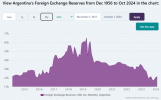Except for owning a vehicle and property, I feel like this is my husband and I too. My field is dollarized, and his is pesified, and I'm just hoping in the next 2 years to leverage the "stability" of Milei's governance to save for a downpayment and to get a mortgage on a humble apartment in CABA or house/PH in Zona Sur, because I honestly think this time won't be different, the economy will crash again, but at least we can get locked in to a 20 year mortgage, and maybe import a used vehicle tax free as the government is discussing.
I was a kid during the 90s, but I feel like we're beginning to live through Menem's 3rd term.
The music of the carry trade/flattened dollar will stop at some point, but the question is who is going to be left without a chair? Right now my money is, as always, on the poor and working class, while this will be a new era of wealth and stability for the rich, even if there is another 2001esque brutal adjustment, because they'll just buy up everyone's cars and houses for pennies on the dollar when things come crashing down.
All this being said, maybe I'll be proved wrong and we'll become something like Chile, a high income, post-manufacturing, services based domestic economy which exports natural resources, and imports finished goods, but I doubt it. As you've said, this sort of economic policy destroys local manufacturing, so I guess I'm pessimistic. I just want Argentina to succeed.

